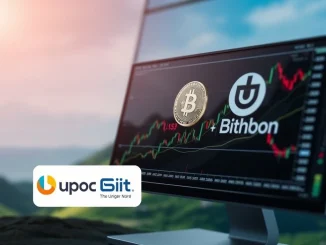
Hold onto your hats, crypto enthusiasts! A dramatic incident has unfolded in the decentralized finance (DeFi) world, revealing a potential chink in the armor of decentralized governance. A crypto whale, operating under the alias BornTooLate.eth, has allegedly manipulated the UMA (Universal Market Access) governance system to influence the outcome of a prediction market on Polymarket. This audacious move has ignited a firestorm of debate around the security and fairness of decentralized decision-making processes in the crypto space. Let’s dive deep into this fascinating, and frankly, alarming situation.
What Exactly Happened with UMA Governance and Polymarket?
The core of this crypto drama revolves around a prediction market on Polymarket centered on a Ukraine-related event. The specific market in question was seemingly unresolved, leading to a dispute. This is where the UMA oracle governance mechanism comes into play. UMA is designed to provide decentralized oracle services, enabling smart contracts to access off-chain data in a secure and trustless manner. Crucially, UMA token holders have governance rights, allowing them to vote on resolving disputes and other protocol matters.
Here’s a breakdown of the events:
- The Prediction Market Dispute: A Polymarket contract, focusing on a Ukraine-related event, faced a dispute regarding its resolution. The details of the exact prediction are less important than the mechanism used to resolve it.
- Enter BornTooLate.eth: An Ethereum wallet identified as BornTooLate.eth, wielding a substantial 1.3 million UMA tokens, entered the fray. This significant token holding granted them considerable voting power within the UMA governance system.
- The Decisive ‘Yes’ Vote: BornTooLate.eth cast a ‘yes’ vote to resolve the disputed Polymarket prediction market. This vote was pivotal in swaying the outcome, despite reports suggesting that ‘no deal’ had been signed regarding the event in question.
- Community Backlash and Polymarket’s Stance: The resolution triggered immediate backlash from the crypto community, with many questioning the fairness and legitimacy of the outcome. Despite the uproar, Polymarket announced that no refunds would be issued, standing by the result determined by the UMA oracle.
Why is this a Big Deal for Decentralized Governance?
This incident shines a spotlight on the vulnerabilities inherent in decentralized governance models, particularly when significant token holdings can be leveraged to exert disproportionate influence. While decentralized governance aims to distribute power and prevent centralized control, it’s not immune to manipulation. The BornTooLate.eth case raises critical questions about:
- Whale Influence: The concentration of governance tokens in the hands of a few, often referred to as “whales,” can undermine the democratic ideals of decentralized systems. A single entity possessing a large token stake can potentially override the collective will of smaller token holders.
- Oracle Manipulation Risks: Oracles are crucial bridges connecting blockchain smart contracts to the real world. If oracle systems can be manipulated, even through governance mechanisms, the integrity of smart contracts and DeFi platforms is at risk. This incident highlights a potential attack vector: oracle manipulation through governance power.
- Fairness and Trust: For decentralized platforms like Polymarket to thrive, users need to trust in the fairness and impartiality of the resolution processes. Incidents like this can erode trust and discourage participation if users perceive the system as easily manipulated.
Understanding the Mechanics of UMA and Oracle Governance
To fully grasp the implications of this event, it’s essential to understand how UMA’s decentralized governance and oracle system work. UMA employs a Data Verification Mechanism (DVM) to resolve disputes and verify data requests. UMA token holders participate in this process through voting.
Here are some key aspects of UMA’s oracle governance:
| Feature | Description |
|---|---|
| Decentralized Oracle Network | UMA aims to provide a secure and decentralized way for smart contracts to access off-chain data. |
| Data Verification Mechanism (DVM) | The DVM is used to resolve disputes and ensure the accuracy of data reported by oracles. |
| UMA Token Governance | UMA token holders have voting rights and can participate in governance decisions, including resolving oracle disputes. |
| Economic Incentives | The system relies on economic incentives to encourage honest participation and discourage malicious behavior. |
In this case, BornTooLate.eth seemingly leveraged their significant UMA token holdings to influence the DVM process, effectively using UMA governance to resolve the Polymarket bet in their favor.
Was it Profitable? Examining the Crypto Manipulation and Financial Impact
Interestingly, while the act was controversial, the attacker’s financial gain appears to be relatively limited. Reports indicate that the largest winner in this scenario gained approximately $55,000, while the biggest loser forfeited around $73,000. This suggests that the primary motivation might not have been purely financial profit, but potentially something else, such as:
- Testing the System: The attacker might have been probing the limits and vulnerabilities of the UMA governance system and Polymarket’s reliance on it.
- Market Manipulation Experiment: It could have been an experiment in market manipulation to demonstrate the potential for exploiting governance vulnerabilities.
- Ideological Motivation: In the context of a Ukraine-themed market, there might have been underlying ideological or political motivations driving the action.
Regardless of the motive, the incident serves as a stark reminder that even decentralized systems are susceptible to crypto manipulation, especially when governance power is concentrated.
What are the Broader Implications for Polymarket Bets and Prediction Markets?
This event raises crucial questions about the future of prediction markets like Polymarket and their reliance on decentralized oracles. If outcomes can be swayed through governance manipulation, it undermines the credibility and trustworthiness of these platforms.
To maintain user confidence and ensure the long-term viability of prediction markets, platforms and protocols need to consider:
- Strengthening Governance Mechanisms: Exploring ways to mitigate whale influence and enhance the robustness of decentralized governance systems. This could involve mechanisms like quadratic voting or delegation models that empower smaller token holders.
- Diversifying Oracle Sources: Reducing reliance on a single oracle provider and exploring multi-oracle solutions to minimize the risk of manipulation.
- Enhanced Dispute Resolution Processes: Developing more transparent and robust dispute resolution mechanisms that are less susceptible to governance attacks.
- Community Education and Awareness: Educating users about the risks and limitations of decentralized governance and the potential for manipulation.
Actionable Insights: Navigating the Risks of Decentralized Governance
For participants in the crypto space, especially those involved in DeFi and prediction markets, this incident offers valuable lessons and actionable insights:
- Be Aware of Governance Risks: Understand the governance mechanisms of the platforms and protocols you use, and be aware of the potential for manipulation.
- Diversify Your Risk: Don’t put all your eggs in one basket. Spread your investments across different platforms and protocols to mitigate the impact of potential governance failures.
- Engage in Governance: If you hold governance tokens, actively participate in voting and governance processes to contribute to the security and fairness of the system.
- Demand Transparency and Robustness: Support projects that prioritize transparency, security, and robust governance mechanisms.
Conclusion: A Wake-Up Call for Decentralized Crypto Governance
The BornTooLate.eth incident serves as an alarming wake-up call for the crypto community. It highlights the critical need for ongoing vigilance and innovation in the realm of decentralized governance. While decentralization offers immense potential, it’s not a silver bullet against manipulation. Strengthening governance mechanisms, fostering greater transparency, and promoting community awareness are crucial steps to building more resilient and trustworthy decentralized systems. The future of DeFi and prediction markets hinges on our ability to learn from these events and proactively address the evolving challenges of decentralized governance. This is not just about a Polymarket bet; it’s about the fundamental principles of fairness and trust in the decentralized web.



